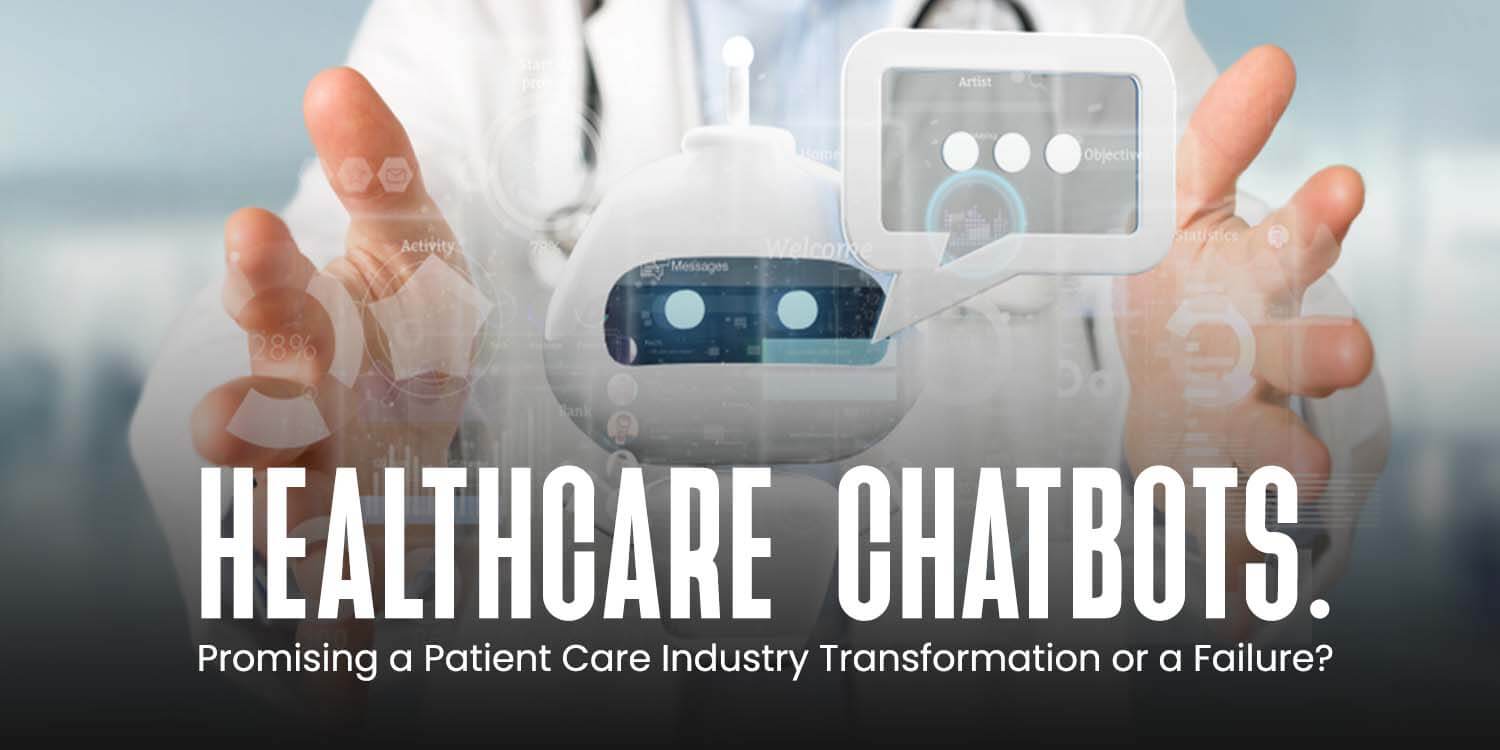13 Dec 2022
Updated on December 30th, 2022
Healthcare Chatbots: Promising a Patient Care Industry Transformation or a Failure?
Ankit Singh

The recent technological advancement has brought a drastic change in healthcare industry. And that change is too favorable to experience. It has made the patient care landscape more efficient for everyone to get help from medical professionals.
While several trending tech solutions in healthcare have made it easy for businesses to expand and deliver better, healthcare chatbots are the most prominent example of technology enhancement.
The healthcare industry has experienced a technology shift like ever with the introduction of chatbots. Now, it’s easy and quick to access medical information while facilitating patients with advanced and personalized healthcare solutions. And all credit goes to chatbot technology for enabling it to handle some tasks putting it on autopilot.
So, as far as the future of the healthcare industry chatbots is concerned, they promise a fruitful tomorrow. It’s a futuristic technology that offers several benefits. In case it sounds too much to be true, going through a detailed guide on chatbots in healthcare will be a good step to move further. Thus, here are all details about bots in the medical field; how to develop them, cost, benefits, and whatnot.
Healthcare Chatbots – What Are They, and What Is the Role of Chatbots in Healthcare

Healthcare chatbots are software that can imitate a conversation like humans. Nowadays, the medical industry uses such chatbots to conduct business communication facilitating the patients to get assistance. Besides, some healthcare businesses use voice interfaces, while others use text-based interfaces.
In a broad picture, chatbots in healthcare simplify the repetitive tasks that can be performed without involving human staff. Any medical service provider can contact a healthcare app development company to develop a healthcare chatbot to advance their facilities.
Moreover, a healthcare chatbot works as a personal medical assistant that can remind to take medicines, diet, exercise, body weight, and so on. Such AI healthcare chatbot also facilitates communication among medical service providers, insurance companies, and patients.
In addition, smart healthcare chatbots track patient satisfaction and schedule, cancel, or no-show appointments. If designed and developed strategically, chatbots in healthcare can make a patient feel heard, validated, and valued. However, these AI-based healthcare chatbots serve as:
- Healthcare Consultants
- Self-Care Coaches
- Hospital Administrators
- Elderly Care Providers
- Emergency Alarm
But, before you approach a technology partner to develop a chatbot for your healthcare facility, it is important to know the different types of chatbots in healthcare. So, continue reading.
What Are the 3 Basic Types of Medical Chatbots?
Conversational or AI Chatbots
Chatbot technology in healthcare has become so advanced that gone are the days when chatbots used to develop through logic. With the introduction of Natural Language Processing (NPL) and Machine Learning (ML) algorithms, creating a chatbot that learns human intent and language is much easier.
Also, there are different maturity levels for bots, for instance, Level 1 maturity bot and Level 2 maturity bot. The higher the intelligence level, the better responses are achievable. Such a conversational AI in healthcare perceives conversation from a holistic perspective rather than deducing sentence meaning.
Since users’ privacy is at stake, any app development company must follow HIPAA compliance for healthcare app development while developing conversational chatbots.
Prescriptive Chatbots
Taking Natural Language Processing (NLP) one step ahead, perspective chatbots are about to revolutionize the healthcare industry. Along with conversational AI chatbot features, these advanced chatbots are efficient enough to provide therapeutic solutions to users.
Perspective chatbots are available in the market conducting cognitive-behavioral therapy to an extent. And it assists users in getting mental healthcare assistance. Woebot is an example of a perspective chatbot developed by Stanford University. It converses with patients with anxiety, depression, or other mood disorders for treatment and cure.
However, one must know the target audience and what is good for their needs to develop an effective chatbot. Most importantly, while designing such a chatbot, the development technology partner must consider data privacy. Therefore, following HIPAA and other data protection acts is a must.
Informative Chatbots
The sole purpose of developing informative chatbots is to provide resourceful information to users via push notifications and pop-ups. Also, these healthcare chatbots can provide customer support and automated information for getting better health. Majorly, mental wellness or news websites integrate information chatbots to offer detailed insight on specific medical topics of user’s interest.
Moreover, while developing informative chatbots in the healthcare industry, pay attention to the healthcare UX design to achieve the intended business goals.
Also read: How Chatbots Make E-Commerce Marketing More Effective?
Chatbots in Healthcare: Business Benefits of Its Implementation

Integrating chatbots in healthcare solutions brings lots of benefits. Not only medical practitioners but also patients and stakeholders can leverage healthcare chatbots. Since doctors pay attention to a patient’s condition, sometimes they might need more time to dedicate the required attention to each patient. Thus, HIPAA compliant chatbots are essential for the betterment of the patient care industry. However, here are some top benefits of chatbots in healthcare.
Scalability
Sometimes, a medical service provider experiences multiple requests at the same time. In order to address such requests, the healthcare service provider may require more workforce to tackle the situation. But having a smart chatbot with AI integration can efficiently handle thousands of requests at one time without any glitches. Thus, chatbot technology in healthcare is essential to scale the business.
24X7 Access to Patients
With the use of chatbots in healthcare, providing patient information is easy. Unlike live agents, they don’t work on a dedicated time. So, no matter when a patient needs information about medical services, healthcare chatbots help them by giving instant assistance.
No More No-Shows Cases
A Forbes report claims that every missed appointment can average cost a doctor or healthcare professional $200. By incorporating a healthcare digital assistant into your services, the patient can receive reminders for the appointment. It can reduce patients’ chances of not turning up at the scheduled time. Many doctors can save money and time by consulting with a healthcare company to develop a patient engagement chatbot.
Efficient Record-Keeping
Having virtual assistance can bring additional benefits like record keeping. For example, Chatbots for medical diagnosis can drive decisions based on instant notification to a medical professional on critical medical reports. In addition, with chatbots, a medical service provider can achieve patients’ healthcare records for better treatment. And the patients don’t need to carry a luggage of medical history along with them every time they visit a doctor.
Huge Savings
A report from Juniper states that healthcare chatbots save approx $3.6 billion worldwide. In comparison, the number was $2.8 billion in 2017. Simply put, paying more staff for extra work will not be an issue when the healthcare industry integrates chatbots.
Since this is not the end of the list of benefits of chatbots in healthcare, many use cases can help medical professionals level up the patient care industry. Bots in the medical field provide benefits for both; doctors and patients. Let’s look at some of the top use cases of chatbots in the medical industry.
Top 5 Use Cases of Chatbots in Healthcare
Care Management for Chronic Diseases
Chatbots in healthcare have made a shift in the care management industry for good. They assist in providing patients with chronic illnesses with crucial information. For instance, a patient scheduled for a colonoscopy will get all information and educate about the same. Also, if the patient has any query or concern regarding the operation, the telemedicine chatbot can assist them with details.
Using these medical chatbots, one can reduce invasive medical procedures canceled at the last minute. Also, by providing pertinent advice to chemotherapy patients, these conversational chatbots contribute significantly to the treatment provided in oncology.
Additionally, chatbots can advise family members and caregivers on how to support loved ones suffering from cancer. Even health insurance companies use healthcare industry chatbots to educate customers about the advantages of insurance.
Self-Care Assistance or Emergency Care for Patients
Many patients rely on digital assistants to get specific nutritional advice and remind them to take their prescriptions on schedule. The reason behind offering self-care assistance from AI-based chatbots is that they are fully equipped to assess the body’s vital signs. Bots can improve patient care by keeping an eye on the patient’s health and offering the right medical advice.
While helping patients stay motivated to achieve their health objectives, they can spot people who require emergency medical care. Also, chatbots allow doctors access to all chat transcripts so that patients don’t have to repeat themselves. And patients may receive the care they require when they need it the most.
Accessing Health Records Securely
Chatbot technology in healthcare can facilitate saving medical records effortlessly. By integrating healthcare AI chatbots with the EMR/EHR systems, storing, exchanging, managing, and maintaining patient health data becomes seamless. A doctor or the patient can then safely access these documents whenever they need to access them. The top healthcare app development company uses chatbots while developing medical applications to deliver top-notch experiences.
Point-of-Care Clinician Support
Healthcare chatbot implementation can help doctors to get real-time drug information from virtual assistants. It also suggests prescription drug options and provides a list of the active components in various medications. If any medical service provider includes chatbots in their system, it will make things simple and quick. For instance, doctors can recommend a specific prescription with the right dosage and medication instructions.
Processing Bills and Claims
For any healthcare service provider, the last thing they would want to do is keep the patient waiting to process the payment. When you enable the billing system with chatbot technology, it can speed up the process. The chatbots in healthcare industry are efficient enough to identify medical history and the associated expenses. And with such information, processing bills and claims become simple. Using this technology with the backend billing system of the organization’s practice, it can safely manage inventory and gather payments. Hence integrate chatbots in medical service systems to deliver advanced patient care.
How to Develop a Healthcare Chatbot?

Design Conservation-Minded Flows
Chatbot-based automated healthcare solutions must be able to address patients’ concerns satisfactorily. Users must feel as if they are speaking to an actual person because the conservation happens over texting. As a result, healthcare chatbots must take care of the tone of their responses, relevance, and context.
Programmers need to understand that exchanging messages concludes a meaningful conversation. For example, if a user submits his symptoms, the chatbot must evaluate them and suggest the best action. The chatbot must advise the appropriate over-the-counter medication, advice on diets, or even offer a consultation with a doctor for a patient with stomach ache and fever.
A chatbot should evaluate the data gathered regarding a user’s health issues and respond appropriately with helpful ideas. Also, while developing a healthcare AI chatbot, use natural language processing (NLP) to assist chatbots in determining the optimal response for each scenario. In addition, using medical informatics, the chatbot must be able to create the best reactions to communications concerning symptoms.
Design and Interface
The method for engaging with a machine is an interface or user interface (UI). And the design and interface of an AI chatbot for healthcare play a crucial role in its success. Most healthcare chatbot systems have a text-based interface where users must input their questions. However, some even have voice-based interfaces.
Developers frequently use platforms like Facebook Messenger, Telegram, and Google Assistant to create chatbot user interfaces. However, for both tech-savvy millennials and elderly individuals with low technological acumen, a decent interface must be simple to use. So, utilize the chatbot technology in healthcare industry and create a robust bot for enhancing patient care services.
Sort Out Your Intentions
For the best user experience, chatbot programs must make conversations seem genuine. In other words, the application must determine context and relevance anytime a user starts interacting through text or speech. In addition, it must select a user’s purpose for utilizing the application.
Natural language understanding (NLU) modules are necessary for chatbots to understand users’ intents and provide the best appropriate responses. A chatbot can utilize these to group user input into the proper categories and determine what the user wants. For instance, if a user reports having stomach discomfort and a fever, the chatbot may advise medicine, dietary changes, or a visit to the doctor. If the user chooses one of these, the interaction must continue as intended and be meaningful. Thus, it would be best if you categorized intentions so that healthcare industry chatbots can efficiently deliver what they are designed to do.
Identify Entities
An entity is a user input component in healthcare chatbot development that details the user’s intention. It’s critical to comprehend consumer wants and provide the appropriate answer. So, before developing a healthcare chatbot, you must identify entities. Since it takes a lot to make a chatbot conversation as natural as feasible, a thorough understanding of intention and entity is necessary. To understand it better, let’s take an example. A patient who lives in Dubai needs medical help for a fever; the entities must be “pharmacy,” “medicine,” and “Dubai.” Therefore entity identification is essential to develop a chatbot in healthcare industry.
Testing
The last stage of creating a healthcare chatbot is testing it. The programmers must thoroughly test it using all the required parameters after it is developed. The intended reaction must be given to every input. Finally, the solution must recognize, classify, and categorize the purpose and entity to determine how accurate the result is.
Technologies to Develop Chatbots in Healthcare
With the advent of healthcare chatbots in the medical industry, the world has started witnessing the ultimate patient care solutions. Since the digital transformation in healthcare is continuous, so chatbot technology in healthcare is. Thus, here is the tech stack for healthcare chatbot development.
Some Platforms for Chabot Development in Healthcare
- Botsify
- Chatfuel
- QnA Maker
- Flow XO
- Dialogflow
- Motion.ai
Top Frameworks & Languages for Medical Chatbot Development
- Microsoft Bot Framework
- Amazon LEX
- Watson Assistant by IBM
- botpress
- Python
- Wit.ai
Be it an early-stage startup or a well-established healthcare firm, contact the top chatbot app development company if you have any ideas about developing a chatbot. The team experts will understand your perception thoroughly and build a unique chatbot while fulfilling business requirements.
How Much Does a Healthcare Chatbot Development Cost?
When it comes to developing a customer chatbot in healthcare, the cost incurred is around $45000 to $60000. However, the final cost to develop a healthcare chatbot depends on the features and advancement of the chatbot. To get an idea, suppose a chatbot is developed using ML and AI algorithms for a mental healthcare app or integrated an app to a medical device; the cost of development may go up.
Thus, depending on the chatbot technology, the cost may vary for the development. This is why all healthcare industry experts suggest hiring an experienced technology partner to build your project. Such agencies know the latest and trending tech stack and implement them to create high-end solutions.
Also Read: How Much Does It Cost To Develop A Healthcare Mobile App?
Are Healthcare Chatbots the Future of the Industry?
The way chatbots have integrated into healthcare systems and provide efficient solutions promises a good future. And more healthcare business owners will be opting for this technology to deliver more user-friendly services. But it is also true that this adaptability is higher, and adoption is slower in the medical field.
Conversational healthcare bots are the trend, and creating one for a healthcare business will be the right step in investment. While it will bring high returns, the benefits of using chatbots in clinical settings are indisputable.
So, without thinking much about it, immediately connect with us to get a world-class chatbot solution and build a healthcare chatbot to stay ahead in the market race.
Get in touch.
Write Us
sales@techugo.comOr fill this form



